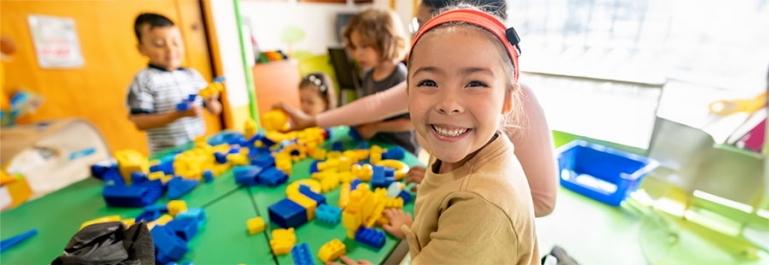Back to School for Kids with Disabilities

Back to School for Kids with Disabilities
The start of a new school year is often a reset for families — a time to adjust to new schedules, set up a new routine, and get to know a new school or teacher. For households of school-aged kids with disabilities, the new school year can be a good time to reevaluate your services and support.
Going back to school presents a time to evaluate items like a child’s Individualized Education Plan (IEP), meet with your child’s support team, establish support from a regional center if needed, and communicate with the child’s school. These topics and more are covered in DRC’s guide for parents, guardians, and advocates called the Special Education Rights and Responsibilities (SERR) manual.
At DRC, we have teams that specialize in advocating for the rights of school-aged children with disabilities. We asked members from the youth practice group, intellectual and developmental disabilities practice group, and the public policy team to share their expertise and advice for parents and guardians of school-aged kids with disabilities.

IEP Updates
The start of the school year can be a good time to review existing Individualized Education Plans (IEP) or to establish a new one. An IEP is a written statement that describes a child’s present levels of performance, learning goals, school placement, and services.
To obtain an IEP, a child must first be evaluated. To start the process for an evaluation, parents or guardians should write a request to the school district—all requests should be made in writing, either email or written, so there is a record of the timeline. Once the request has been made, the district has 15 days to provide an assessment plan, and once the plan is signed, they have 60 days to finish assessments and hold an IEP meeting.


Once a child has an IEP, the start of each school year presents an opportunity to check-in with the child’s teacher and school to evaluate how the IEP is working. Torres recommends that parents and guardians schedule an IEP meeting at the start of the school year so the IEP team can, “see if the IEP is appropriate, if it's still working, if anything needs to change.”
Torres said that another benefit of having an IEP meeting at the start of the year is to provide a copy of the IEP with their child’s new teacher and principal. This prevents delays in communication and ensures that everyone has the same information to best support the child.
“We also want to make sure that parents know that they have the right to record IEP meetings,” said Allegra Cira Fischer, Senior Attorney in the Public Policy team. “That is something that is allowed, whether they speak a language other than English as their primary language or not.”

Support Outside of School
Vivian Haun, a senior attorney with the intellectual and developmental disability practice group shared that outside of an IEP, there are support systems available for school-aged kids with intellectual and developmental disabilities (IDD) through the regional center system. Regional centers provide case management and pay for services. A child or adult can get regional center services if they have a developmental disability. They can apply at the regional center that serves their area.
Haun said that regional centers can help with after school programs, recreation, and enrichment activity accommodations. She noted that some school-sponsored after school programs don’t know how to address the needs of kids with IDD, which is where the regional centers can provide training or offer alternative program options.


Haun recommends families approach their regional center service coordinator at the start of the school year to talk about getting after-school support for their child.
She said that because regional centers can’t get government funding for programs that other public entities must cover, requests for support should be carefully framed as supporting the child’s need for “community integration.”
“They [parents and guardians] should be really intentional and clear and explicit about pointing out that this is not an academic need, it’s not a school-based thing,” Haun said. “It [the request] would need to be characterized as community integration—it helps with inclusion, with their health and safety. Frame it as first and foremost what the child needs.”
Most regional centers also have educational advocates to help families with education issues. Regional center service coordinators and educational advocates can often attend IEP meetings with families if they ask. This can be a helpful support.
Haun said that there are grants for organizations to help develop more integrated programs for families of children with IDD. Learn more about the grants here.

Discipline
Children with disabilities are often subject to increased measures of discipline such as suspensions and expulsions. For parents and guardians, the start of the school year can present opportunities to create understanding between educators and children, to combat the misunderstandings that underpin many of the disciplinary actions.
Torres said that some students have disabilities that can manifest as the fight or flight response, so students may run away to try to get themselves to “calm down and be less stimulated.”
Torres also noted that students with attention deficit hyperactivity disorder (ADHD) may have challenges with impulsivity. Torres recommends the IEP team work together to understand the connection between behaviors and disability.
“Students should never be subject to discipline for behavior that is caused by their disability, and unfortunately, that's something that we see,” Fisher said.

Going Forward
The start of a new school year can present an opportunity to review support for children with disabilities between their families, guardians, and their schools.
Torres said she’s noticed that students who have success often have parents and guardians who communicate actively with a child’s school team throughout the year, as well as have teachers who are invested in the student’s success.




